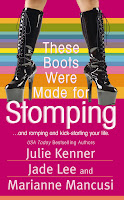STATUS: TGIF! Lots to do still over the weekend. One of these days I’ll get caught up and I’ll feel less guilty.
What’s playing on the iPod right now? DO I DO by Stevie Wonder
Here’s an interesting monkey wrench to throw into our whole discussion concerning hardcover versus paperback.
Many of you mentioned that that the price point on HC is just too high—you wait for the paperback release, which often happens about a year after the HC release.
In recent articles I’ve been reading in Publishers Weekly, it has been often mentioned that sales of the mass market paperbacks have been on the decline. In other words, the pocket size versions that usually have a very nice price point of $5.99 or $6.99.
Now I have to wonder why that is. If price is the issue, then that certainly solves it so the reader can buy the book. It’s only a couple of dollars more than a fancy Starbucks latte. (That’s putting it into perspective!). Yet, sales are down over previous years.
What’s causing that do you think? Is it aging baby boomers who can’t (or don’t want to struggle) with the smaller print? I’m not there yet but soon I’ll be able to relate.
Trade paperback (same size as HC) is a bit on the rise—but not in huge numbers. (I really wished I had saved that article or articles so I could reference it here. I’m too lazy to look it up right now as I only have a few minutes to blog before I head out of the office.)
If price is the issue, than folks should be buying more mass markets rather than fewer. That doesn’t seem to be the case…
Have you seen the slightly over-sized mass market versions some publishing houses have been experimenting with for their big name authors? They aren’t as big as the trade pbs and not as small as the regular mass market. I know they were experimenting to see if that would draw readers. I haven’t seen any statistics on those yet. They are priced a buck or two higher than the regulars.


